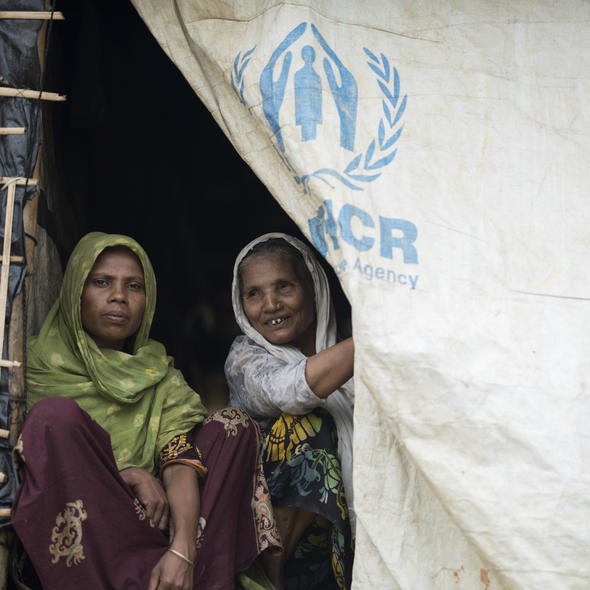Multi Sector Needs Assessment: Cox’s Bazar, Rohingya Refugee Response – July 2018
Bangladesh, 2018
Get MicrodataIdentification
UNHCR_BGD_MSNA_2018_v2.1
Multi Sector Needs Assessment: Cox’s Bazar, Rohingya Refugee Response – July 2018
| Name | Country code |
|---|---|
| Bangladesh | BGD |
An estimated 723,000 Rohingya refugees have fled violence in Myanmar’s Rakhine state since August 25, 2017. Most of the newly-arrived refugees rely on humanitarian assistance, having left with few possessions and exhausted their financial resources during the journey. The monsoon season began in May and continues into September, threatening the vast majority of refugees living in makeshift shelters and settlements highly vulnerable to floods and landsides. To understand the priority needs of the refugees, a Multi-Sector Needs Assessment (MSNA), comissioned by UNHCR and with technical support from REACH, was conducted at the household level in 31 refugee sites (3,171 households were surveyed). Translators Without Borders supported in questionnaire translation and enumerator training. This survey identified a number of areas where the basic needs of Rohingya refugees are being met. At the same time, this assessment has identified continuing service gaps in the Rohingya response. For example, the majority of households do not believe there is enough light at night to safely access latrines, and WASH facilities are generally perceived as dangerous areas for girls under age 18. In terms of access to protection services, only a small number of households report members making use of children and women friendly spaces. Despite widespread distribution coverage of key non-food items such as kitchen sets, demand for these items remains high, and refugees are spending the greatest portion of their limited financial resources on basic items including food, clothing and fuel. Findings suggest that there are uncertainties around actions to prepare for cyclones. The mahjis remain almost the sole focal point for communication and complaints with refugees, reflecting their continued prominent position within refugee communities. Finally, the median household debt is twice the median household income for the 30 days prior to data collection, with only two-fifths of households reporting any source of income at all.
Households and individuals
Version
2.1: Edited, anonymous dataset for licensed distribution.
Scope
The scope of the survey includes:
- household characteristics
- needs
- income
- expenditure
- risk perceived
- shelter details
- individual characteristics
- health
- working sector
| Topic |
|---|
| Shelter/Other Infrastructure |
| Domestic Needs/Household Support |
| Income Generation |
| Basic Needs |
| Health |
| Food security |
| Education |
Coverage
31 refugee sites in the upazilas of Ukhiya and Teknaf in Cox's Bazar district.
Producers and sponsors
| Name |
|---|
| UNHCR |
Sampling
Data was collected via a household survey, conducted in 31 of the 34 refugee sites open at the time of data collection (data collection did not take place in Camp 4 and Camp 20 Extension since these camps were empty at the time of study design; data collection was aborted in Kutupalong Refugee Camp due to security concerns). The sample frame was developed to yield household-level results that were representative at the camp level at a 95% confidence level with 10% margin of error at the camp level, and 95% confidence level with 5% margin of error at aggregate level for all camps. For several indicators, data were collected on individuals within the household, rather than at the household level. Since sampling took place at the household level, data for these indicators is indicative and not statistically representative.
Sample weights for the household data were computed dividing, for each camp, the population by the sample size.
Survey instrument
Questionnaire has the following sections:
- general information
- health
- food assistance
- site management
- direct observation
Data collection
| Start | End |
|---|---|
| 2018-07-02 | 2018-07-31 |
| Name |
|---|
| Impact - REACH |
Data collection was conducted by four teams of between seven and eight enumerators (total 37) overseen by team leaders. Team leaders were in turn overseen by a Field Coordinator. Prior to data collection, enumerators underwent a three-day training to familiarise them with the tool and with field protocols, as well as code of conduct and basic protection principles . Training was followed by a one-day pilot to identify and troubleshoot issues with tools and protocols. During data collection, GPS points and a map of each camp were then uploaded to enumerator phones. Each day, enumerators were assigned a list of GPS points by their team leaders, and instructed to navigate to each point and select the nearest household for interview. Informed consent was sought, received, and documented at the start of each interview. Enumerators were instructed to ask respondents to conduct the interview in a private place in order to minimise the possibility of influence by other household members. However, given the congested nature of the camps this was not always feasible. During interviews, data was entered directly onto smartphones using the Kobo app. Interviews lasted an average of 45 minutes each. All completed interviews were uploaded to the server at the end of each day. Throughout data collection, team leaders monitored enumerator interview practices using a quality checklist and provided feedback on an ad-hoc basis and during daily debriefings.
Data processing
Data was anonymized with recoding and local supression.
Data Access
Cite this data as follows:
UNHCR (2018) Multi Sector Needs Assessment: Coxs Bazar, Rohingya Refugee Response July 2018. UNHCR microdata library: https://microdata.unhcr.org
Contacts
| Name | Affiliation | |
|---|---|---|
| Curation team | UNHCR | dencomdl@unhcr.org |
Metadata production
UNHCR_BGD_2018_MSNA_DDI_v1.0
